Next in Line
Next in Line: Apothecary's Chef Albert Gonzalez serves up soulful dishes
Editor's note: As Austin continues to grow and thrive as a culinary epicenter, we’ve seen certain big-name chefs grow to demi-god celebrity status. But in kitchens, bars and restaurants across the city, there is so much more talent that often goes unspoken. Next in Line is a series celebrating back of the house heroes who might just be the next household name.
Name: Albert Gonzalez
Kitchen: Apothecary Cafe & Wine Bar
Position: Executive Chef
Hometown: Chicago, Illinois born and raised. I met my wife in Chicago and then a year and a half, two years back we actually moved to the Bahamas and lived there for a bit. It was the first time I’d lived outside Chicago and as soon as I realized you didn’t have to live through the winter, I was like, “Ok, we’re not doing that anymore!” My wife was actually born and raised in Austin and we were looking to move south. She had ties some down here [and] there’s a young food scene that’s rapidly growing and the weather’s fantastic, so Austin just made sense for us.
When did you first start cooking? I started cooking very, very young. I got my first subscription to Bon Appetit magazine at 8 years old. I knew this is what I wanted to do since I was an itsy, bitsy kid ... There were bunches of us [growing up]! But, with that, everybody had to kind of do their part and I found my part best served in the kitchen. So, yeah, I’ve been cooking for the family since I was 8, 9 years old.
What was your first kitchen job? I was professionally cooking by 16. My first job was in a hotel — the Windham in Itasca, a little suburb of Chicago. I got a job there and I was pretty much the utility guy. Some of the time I was washing dishes, most of the time I was moving around what other people had done. I was kind of a gopher, but it was a way to get into a kitchen and to learn.
Are you self taught? I started culinary school when I was 19 or 20 and went for two years. And then I actually went to Paris and worked there for a short period of time. I was in Europe for about three and a half months and worked in Paris for a month and a half of that. I worked at Michele Boulier, a tiny little cafe in the 5th Arrondissement. Nothing of any world notoriety but it was a great opportunity... and a really good reason to go spend some time in Europe when you’re 21 years old. There was no doubt that was fantastic.
What other places have you cooked? I did a lot of staging throughout Chicago. And not much of it was paid. Most of it was to learn and be exposed to different things. I worked at Spago, Spiaggia, Ambria. I staged at a handful of Chicago’s top restaurants. When I really started working and getting paid, I spent a fair amount of time at Weber Grill Restaurants in Chicago, Public House and Bull and Bear, which were sort of gastropub concepts. I opened a high-end barbecue place on the Gold Coast of Chicago called Chicago q Kobe beef brisket, pork shoulder — ultra high-end barbecue. Then I went to work in the Bahamas in Atlantis, and then I came here.
What chefs were your biggest inspiration? Certainly Thomas Keller. Not only because his food’s impeccable and his concepts are amazing and beautiful, but there’s something great about his story. He wasn’t one of these guys that came out and immediately found success and everything was easy for him. He opened restaurants and he failed. He failed multiple times! But it clearly wasn’t because of lack of talent. Not everything works. So, to me, I respect his food but I also respect his perseverance. I’ve never had the opportunity to work with him — I would’ve loved to. I’ve been to all his restaurants multiple times and that was my closest exposure to him.
Rick Bayless was a huge influence on me in Chicago. I did some staging at his restaurants — Topolobambo, Frontera Grill — and his food’s amazing. He’s really absorbed a culture that isn’t his and made it a part of himself. And, more than that, I love the person he is. He’s super down to earth — he’s a critically acclaimed name, but if you run into him at the farmers market, he’s just some guy named Rick!
Also, Chef Tony Fraske. We worked at a lot of great places, and he was just kinda somebody who taught me about being myself. Learning other people’s style, other people’s food, is important, but making my own food is really important and that’s where the happiness is. And it was great to have somebody like that encouraging that the whole time.
How would you describe your style of food? If I must? I’d say it’s New American Cuisine, which is a great tagline lots of people use because it leaves it open to so much. But it’s very European and very classic technique. I very rarely delve into some of the newer molecular gastronomy techniques and all that. I prefer to stay true to some very classic French technique, so I think for me that’s a big part of it — embracing that classic technique and trying to do it justice. So, European-inspired classic technique, I guess?
And we put a lot of thought into every detail of every dish ... As soon as I try a dish and say, “Oh, it’s perfect!” that’s the second I turn around and say, “There’s gotta be something.” Every dish goes through 10-15 tweaks. Some are in texture, some are in flavor ... and the plating comes into a lot of it. Sometimes we’ll go through six, seven, eight plating variations.
What do you love about cooking? I love that it allows me to be creative on a daily basis. Every day I get to make something from nothing. Chefs, artists, craftsmen: that line’s very blurred, and I think I enjoy that. For me, a big part of it is being able to do justice to the great ingredients we get our hands on. And paying respect to the work that the rancher did and the work that the farmer does and the fisherman does, and being able to take the work that they did and embellish upon that and allow that product, whatever it may be, to be something special and true to what it is.
What are your favorite things about working in a kitchen? I like the camaraderie. I like that, when you work in a kitchen — especially our kitchen, this tiny little box — you've gotta be pretty close to whoever you work with! And that goes both physically and mentally. You become part of each other’s lives. And that’s what I love about working in a restaurant in general. So often I see these people more than I see my own family. And, with that, they become your family.
What’s your favorite music to listen to in the kitchen? When I want to be creative and I really want to get into the zone, I’m listening to old blues all the time. It’s Buddy Guy, it’s Howlin’ Wolf, there’s some Stevie Ray Vaughan, but it’s old blues. There’s just something about it. It’s soulful, ya know, so I’m sure there’s some part of my head that says, “If you’re listening to soulful music, your food will be soulful! By osmosis, you’ll carry that emotion through!”
But yeah, it’s blues music, which is very different from a lot of kitchens. Most kitchens, it’s very fast-paced and harder going, but I don't know, to me there’s something soothing about listening to the blues and letting that take over.
What do you like to do when you’re not working? I can be found in my garden, no doubt, or just doing general lawn maintenance at the house. I can be found riding my Vespa around town, eating at restaurants — any type of restaurant, any place that’s new. But, more often than not, you’ll find me in my garden. My wife and I spend a lot of time just mowing the grass and hanging out in the backyard with our dogs and growing some herbs and produce and really just enjoying each other’s company.
Favorite food to eat when not working? It’s such a tough question, because I kinda want to eat everything all the time. You know, there are a handful of items that, if I see them on a menu, I’m probably gonna get that. If somebody has a bouillabaisse on their menu, I’m probably gonna get the bouillabaisse, regardless the time of year! I love oysters — I love fresh oysters! Cassoulet — again, I tend to go toward things that are hearty and have their origins in peasant food. There’s just some soul to that. And at home? Man, I love pizza. And God’s honest truth? There are a ton of Cheerios in my life. Breakfast, lunch, dessert — they’re a great utility when I’m hungry.
Favorite dish on the menu at Apothecary? I’m a really big fan of this new menu we just put out, so it’s tough. We do a house-made lamb sausage that I really love. It’s very Middle Eastern. We cut very little pork fat into it. I think most lamb sausages have so much pork fat, you lose a lot of the lambiness and gaminess. We avoid that. It’s really almost pure lamb, heavily spiced with sumac and chili paste, and we’re serving that with harissa and house-made flatbread with a butter bean and olive relish. That type of food, this time of year, really speaks to me. It’s light, it’s fresh, but it still has heartiness, still has heat. I think it’s this beautiful balance that comes throughout that dish.
The other dish I really enjoy is our pork belly. We confit it with saffron and juniper and we bring a lot of flavors out. And the root of the pork belly dish actually isn’t the pork belly. There’s this festival in Spain called the Calçots Festival, where they take these large, white Spanish onions and cut the top and the bottom off. They bury them and they let them grow these huge gigantic ramp sort of things. They char those off, they wrap them and steam them in a cooler, and then they serve them with romesco sauce. And it’s just this really unique, beautiful thing that happens.
I wanted to do something to pay homage to that a little bit. So we take spring onions, we char those off and we serve it with a romesco sauce. But to make it a little more hearty, we do that saffron confit pork belly and a little citrus crostini. And I love that dish — I think it’s a great tasting dish, but I love that it has its roots and its story in Spain. We really wanted to have a story to tell with the dish.
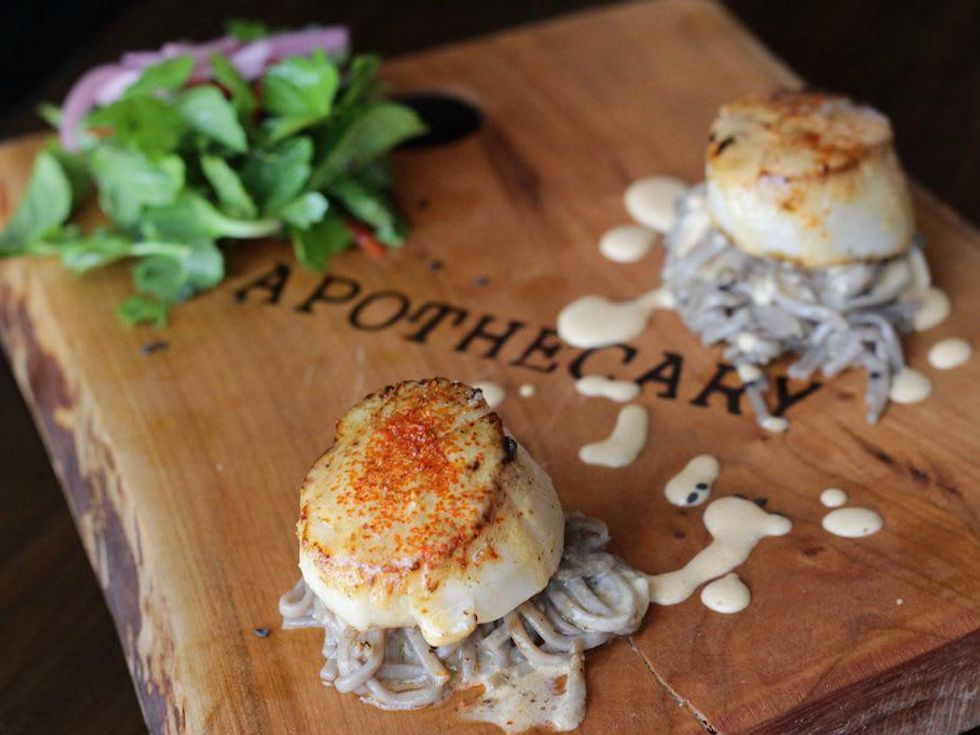
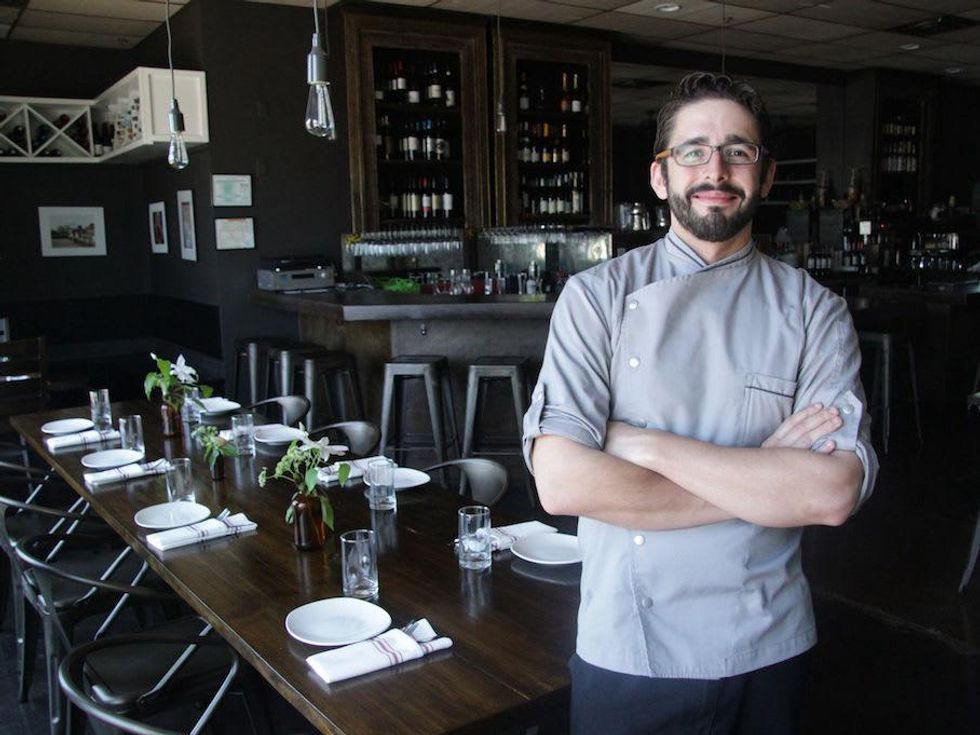
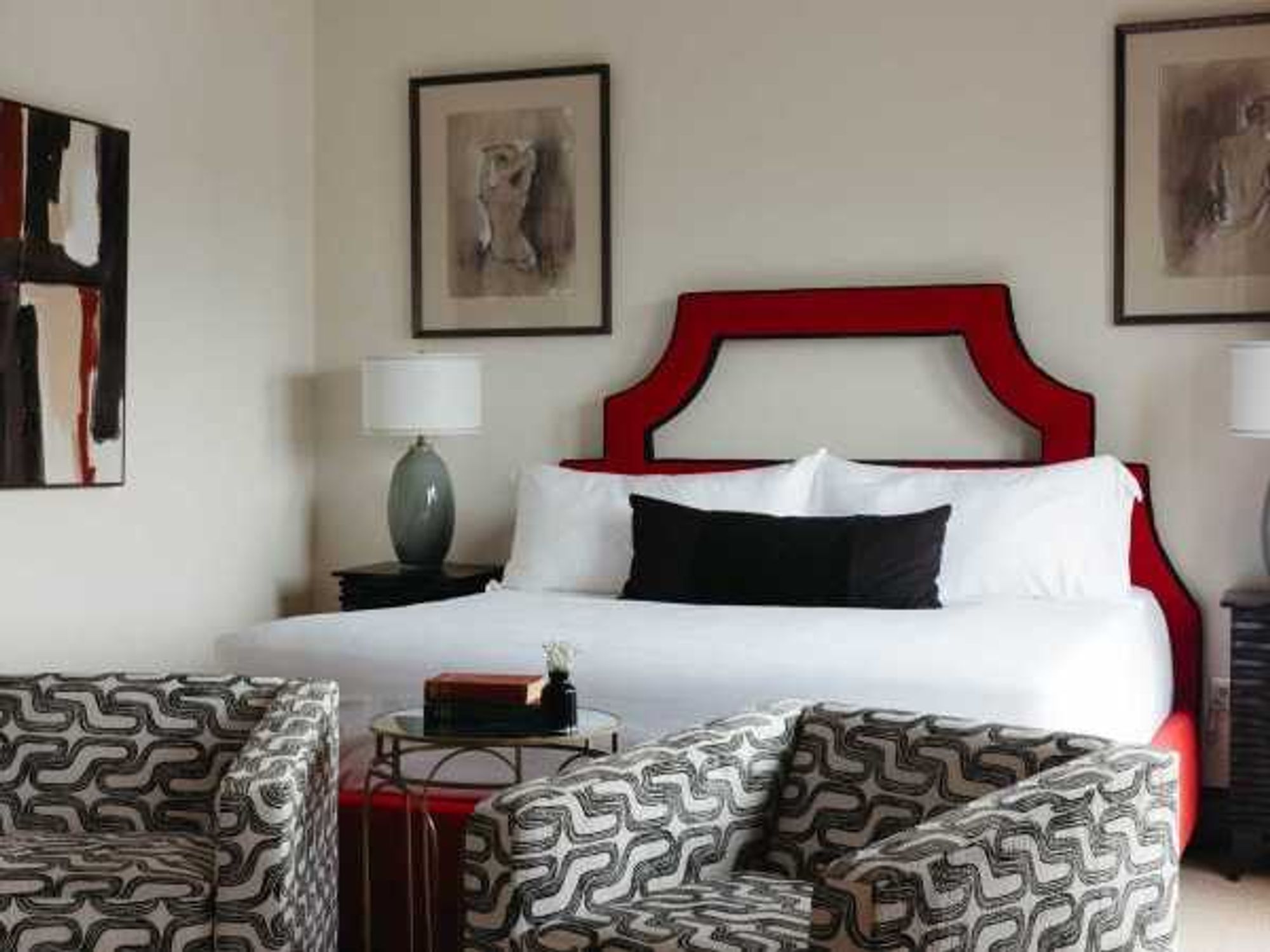
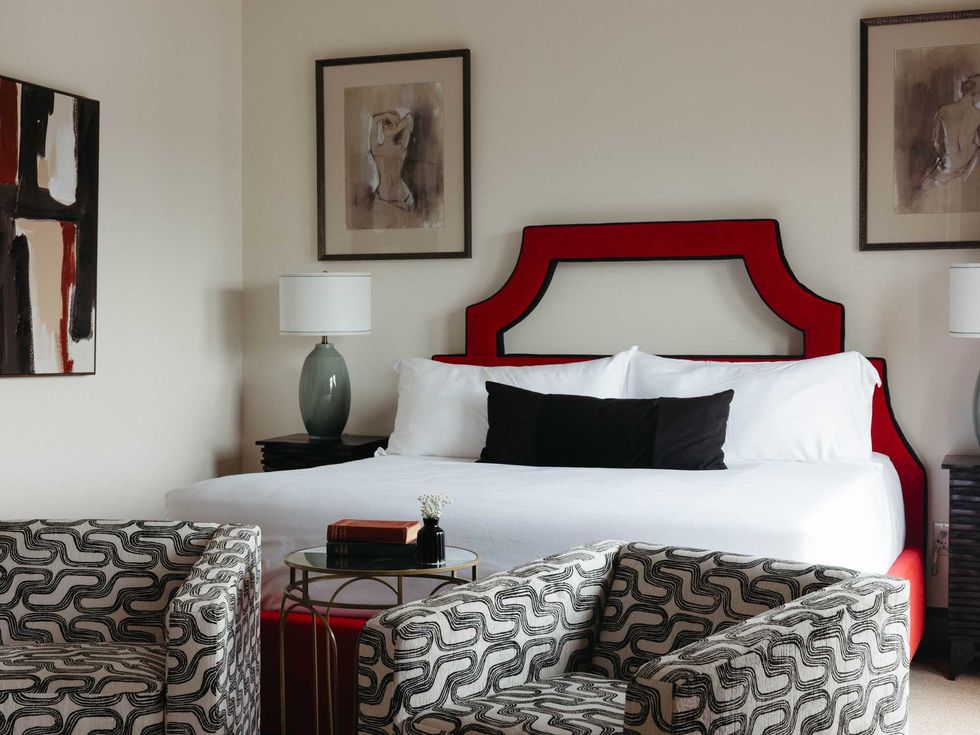
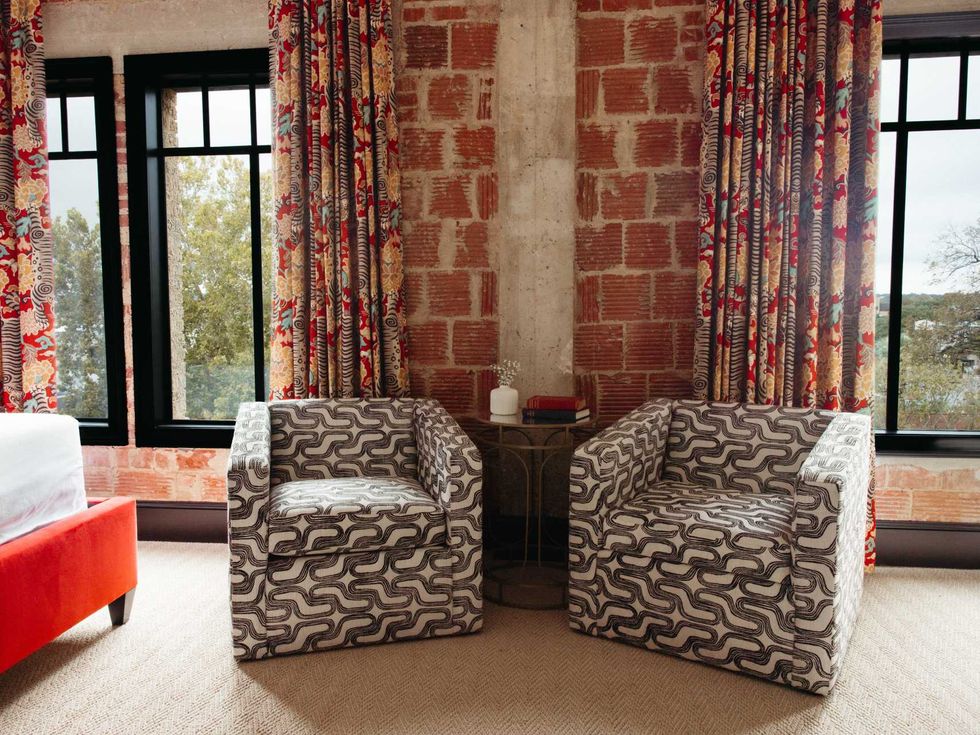
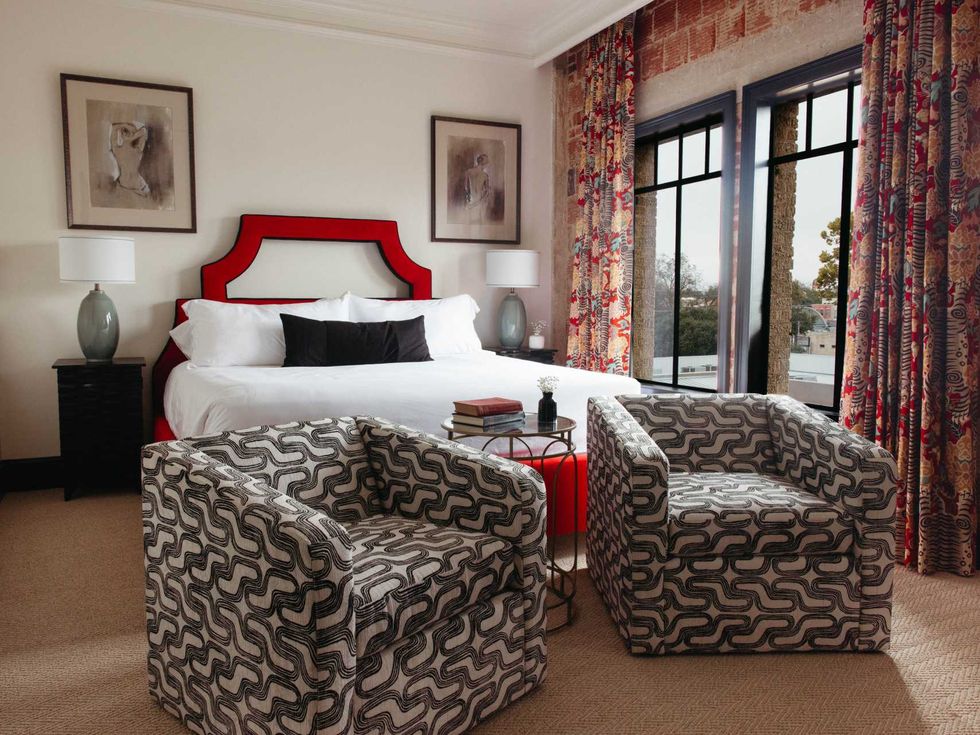

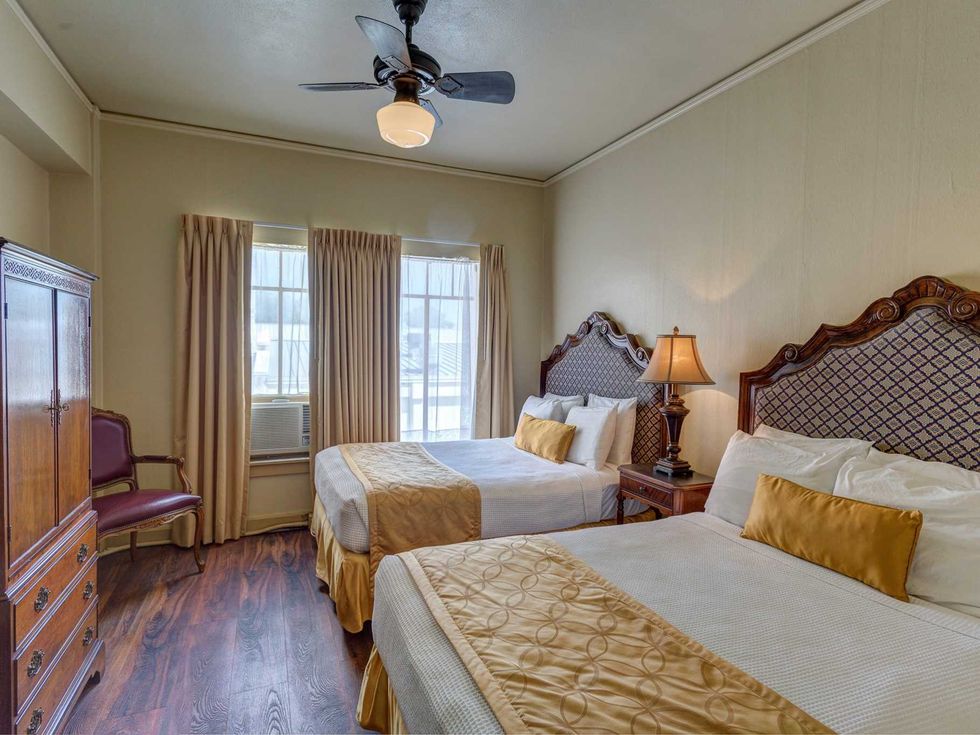
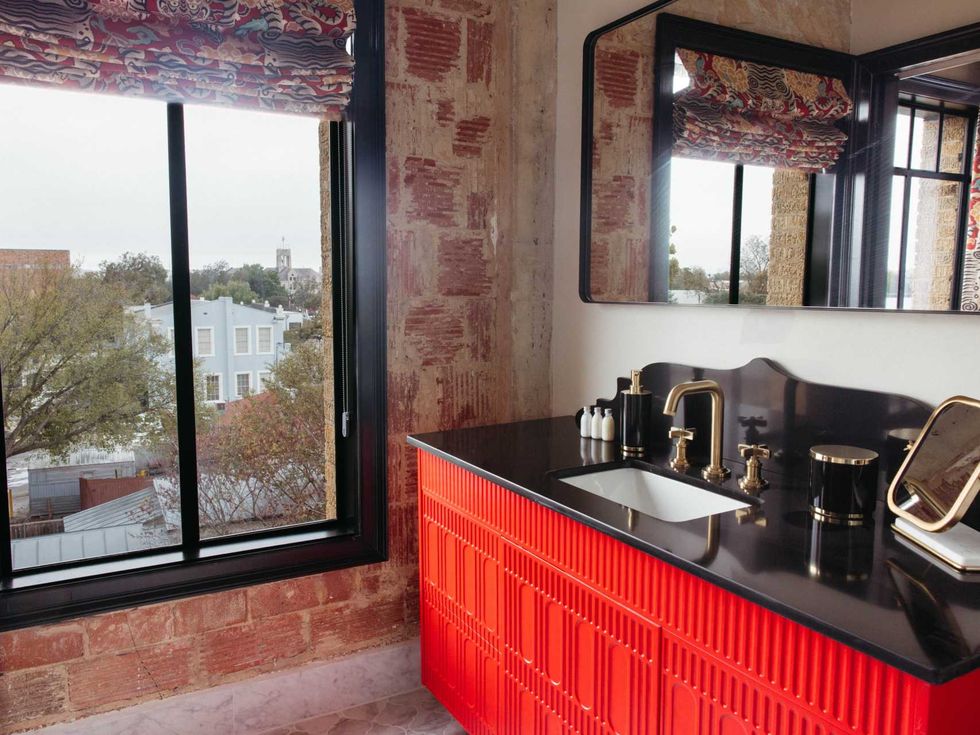 The bathroom's color scheme is a subtle nod to 1920s Art Deco.Photo by Garrett Smith/Giant Noise Partners
The bathroom's color scheme is a subtle nod to 1920s Art Deco.Photo by Garrett Smith/Giant Noise Partners